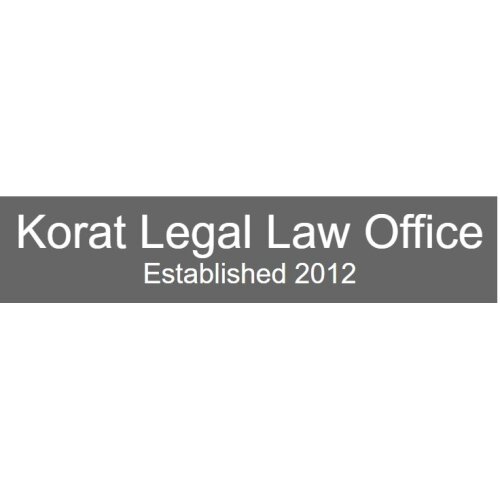Best Child Custody Lawyers in Nakhon Ratchasima
Share your needs with us, get contacted by law firms.
Free. Takes 2 min.
Free Guide to Hiring a Family Lawyer
List of the best lawyers in Nakhon Ratchasima, Thailand
Thailand Child Custody Legal Questions answered by Lawyers
Browse our 1 legal question about Child Custody in Thailand and read the lawyer answers, or ask your own questions for free.
- Change stepdaughter last name.
- Hi Me and my wife want to change my stepdaughter last name. My wife and stepdaughter is Thai and my wife has my last name and we want to change my stepdaughter's last name to the same last name as me and my wife. My wife have sole custody of... Read more →
-
Lawyer answer by Mahanakorn Partners Group Co., Ltd
We at Mahanakorn Partners Group (MPG) have over two decades experience in family law.
Read full answer
Thailand Child Custody Legal Articles
Browse our 3 legal articles about Child Custody in Thailand written by expert lawyers.
- What Are the Child Custody Laws in Thailand?
- Child custody laws in Thailand are a key part of Thai family law, especially for people experiencing divorce or separation in the country. These rules strive to safeguard the best interests of the child while balancing the rights and duties of both parents. Whether you are a parent, guardian, or... Read more →
- Child Custody, Support, and Legitimation in Thailand
- When it comes to family law in Thailand, understanding the legal terms surrounding child custody, support, and legitimation can be very confusing, stressful, and time-consuming. Nonetheless, the situation does not necessarily have to be so complicated. This article aims to provide clarity and guidance on the obligations and rights of... Read more →
- How to Find a Divorce Lawyer in Thailand
- Divorce is a difficult and emotionally taxing procedure that may be made even more difficult when it takes place abroad, such as may be the case in Thailand. Anyone may feel overwhelmed by the legal complexities, cultural variances, and other divorce-related issues. But with the right assistance, you may locate... Read more →
About Child Custody Law in Nakhon Ratchasima, Thailand
Child custody in Nakhon Ratchasima, Thailand, like in the rest of the country, is governed by the Thai Civil and Commercial Code. The legal framework prioritizes the best interests of the child when determining custody arrangements following divorce or separation. Custody can include both physical custody (where the child lives) and legal custody (decision-making power over the child's upbringing). Courts aim to ensure the welfare and stability of the child by considering factors such as parental capabilities, the child's health and safety, and the child's emotional needs.
Why You May Need a Lawyer
Engaging a lawyer for child custody matters in Nakhon Ratchasima can be crucial in various situations. If you are going through a contentious divorce or separation, legal representation can help ensure that your parental rights are adequately protected. A lawyer can also assist in mediation processes, negotiate custody agreements, or represent you in court. Additionally, changes in circumstances, such as relocation or changes in the child's needs, may require legal modifications to existing custody agreements.
Local Laws Overview
Child custody laws in Nakhon Ratchasima are similar across Thailand, focusing on the child's best interests. The court typically prefers arrangements where both parents share responsibilities unless evidence suggests that's not in the child's best interest. The laws emphasize factors like the mental and physical wellbeing of the child, the parental relationship with the child, and each parent's ability to provide a stable environment. Additionally, if the child is of sufficient age and maturity, their wishes may be taken into consideration by the court.
Frequently Asked Questions
What is the legal definition of child custody in Thailand?
Child custody in Thailand encompasses both the rights and responsibilities of parents over the physical and legal decisions concerning a child.
Can custody be shared between parents?
Yes, Thai law allows for shared or joint custody if it is deemed to be in the best interest of the child.
What factors do courts consider in custody decisions?
Court decisions are based on the child's welfare, including emotional, educational, physical, and developmental needs, as well as each parent's ability to meet these needs.
Is the child's preference considered in custody decisions?
If the child is of an appropriate age and maturity, the court may consider their preference, but the ultimate decision will always prioritize the child’s best interests.
How is child custody determined if the parents were never married?
Unmarried parents must independently establish paternity before custody rights are awarded. A court will then consider similar factors as in divorce cases.
Can grandparents or other family members apply for custody?
Yes, under certain circumstances, other family members can apply for custody if it serves the best interest of the child.
What happens if one parent wants to relocate with the child?
Relocation requires mutual consent from both parents or a court order approving the move if it affects existing custody arrangements.
How can custody arrangements be modified?
Custody arrangements can be modified by proving significant changes in circumstances to the court, warranting an adjustment for the child's benefit.
Do both parents need to agree for a custody arrangement to be legal?
Yes, mutual agreement is necessary for joint custody plans. If not, the court decides based on the child's best interest.
What is the role of mediation in custody disputes?
Mediation is encouraged to help parents reach a mutually acceptable agreement without the need for court intervention, focusing on cooperative resolution.
Additional Resources
If you seek more information or assistance with child custody issues in Nakhon Ratchasima, Thailand, consider consulting the following resources:
- Legal Aid Organizations in Nakhon Ratchasima, offering free or low-cost legal assistance.
- The local family court for guidance and necessary paperwork related to custody.
- The Ministry of Social Development and Human Security for child welfare resources.
- Local law firms specializing in family law for professional legal advice.
Next Steps
If you need legal help with child custody matters in Nakhon Ratchasima, begin by consulting with a family law attorney experienced in Thai custody laws. Gather all relevant documents, including evidence of your relationship with the child and any existing agreements. Prepare to discuss your preferred outcomes and any concerns you have regarding your child's welfare. Consider alternative dispute resolution options, like mediation, to settle issues amicably. Finally, stay informed about the legal process and any changes to family law that might affect your case.
Lawzana helps you find the best lawyers and law firms in Nakhon Ratchasima through a curated and pre-screened list of qualified legal professionals. Our platform offers rankings and detailed profiles of attorneys and law firms, allowing you to compare based on practice areas, including Child Custody, experience, and client feedback.
Each profile includes a description of the firm's areas of practice, client reviews, team members and partners, year of establishment, spoken languages, office locations, contact information, social media presence, and any published articles or resources. Most firms on our platform speak English and are experienced in both local and international legal matters.
Get a quote from top-rated law firms in Nakhon Ratchasima, Thailand — quickly, securely, and without unnecessary hassle.
Disclaimer:
The information provided on this page is for general informational purposes only and does not constitute legal advice. While we strive to ensure the accuracy and relevance of the content, legal information may change over time, and interpretations of the law can vary. You should always consult with a qualified legal professional for advice specific to your situation.
We disclaim all liability for actions taken or not taken based on the content of this page. If you believe any information is incorrect or outdated, please contact us, and we will review and update it where appropriate.










